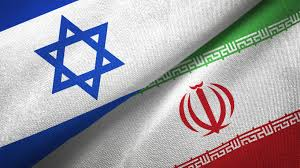Description

Disclaimer: Copyright infringement is not intended.
Context:
- Iran conducted attacks on Israel on April 12, claiming it was retaliation for Israeli airstrikes on an Iranian consulate in Syria that resulted in the deaths of senior Iranian military commanders.
Details
- Limited Scope of Operation: The commander of the Iranian Revolutionary Guard Corps (IRGC), Hossein Salami, stated that the attack was limited in scope, targeting capabilities used by Israel to attack the Iranian consulate.
- Minimal Casualties: While Iran fired drones and missiles at Israel, no significant casualties were reported. Iran claimed to have damaged one Israeli military facility.
- Wider Regional Conflict Concerns: There are concerns about a potential wider regional conflict in the Middle East, particularly between Iran and Israel, following recent attacks and tensions in the region.
Historical background :
- Pre-1979 Iran-Israel Relations: Before 1979, Iran was one of the first Muslim-majority countries to recognize Israel after its formation in 1948. Both countries maintained diplomatic ties and shared common interests, including opposition to Arab hostility.
- Periphery Doctrine: Israel pursued a "periphery doctrine" to counter Arab hostility by forming alliances with non-Arab, mostly Muslim countries like Iran and Turkey.
- 1979 Islamic Revolution: After the 1979 Islamic Revolution in Iran, the regime's view of Israel changed, considering it an occupier of Palestinian land. Iran's Supreme Leader Ayatollah Khomeini termed Israel as "Little Satan".

Change the relations after the 1979 Islamic Revolution :
- Shift in Relations: Iran's relations with Israel deteriorated after the revolution, with both countries seeing each other as adversaries. Iran also sought to challenge major powers in the region, including Saudi Arabia and Israel, both US allies.
- Shadow War and Proxy Conflicts: While direct military confrontation between Israel and Iran has been avoided, both countries engage in proxy conflicts and strategic attacks. Israel has targeted Iranian nuclear facilities, while Iran supports anti-Israel militant groups like Hezbollah and Hamas.
- US Involvement and Uncertainty: Concerns about widening conflict are heightened due to US involvement and support for Israel.
Israel- Iran Issues :
- Israel’s strong alliance with the US increases the insecurity of Iran as there is unwanted Western interference in the Middle East, by the US which poses a direct threat to its security and interests.
- Iran has been under various degrees of US sanctions since the Revolution of 1979. the United States and other countries have imposed unprecedented sanctions to censure Iran and prevent its further progress in prohibited nuclear activities, as well as to persuade Tehran to address the international community's concerns about its nuclear program.
- Iran does not recognize the legitimacy of Israel, and the two countries have been openly hostile to each other since the early 1990s.
- Each has engineered proxy conflicts and covert operations against the other. Both countries have been involved in proxy wars in Syria, Yemen, etc. Both control proxy organizations that are involved in the various ethnic and religion-based conflicts in the region.
- Israel considers the Iranian nuclear program an existential threat. Operational since September 2011, the Bushehr I reactor marked Iran's entry into nuclear power with Russia's assistance. This became an important milestone for Rosatom to become the largest player in the world nuclear power market.
- Israel is widely suspected of having carried out targeted assassinations of important Iranian figures, including nuclear scientists, and cyber attacks against the country.
- Being a predominantly Shiite Muslim country in a region where Sunni Saudi Arabia is also a large, resource-rich, and influential nation, the two countries have been geopolitical rivals for a long.
Source:
https://indianexpress.com/article/explained/everyday-explainers/history-israel-iran-relations-middle-east-9270079/
|
PRACTICE QUESTION
Q. "Discuss the evolution of relations between Iran and Israel since the 1979 Islamic Revolution, highlighting the geopolitical dynamics, proxy conflicts, and strategic considerations that have shaped their interactions. Analyze the role of external actors, such as the United States, in exacerbating tensions between the two nations, and assess the implications of their strained relationship on regional stability in the Middle East."(250 words)
|













